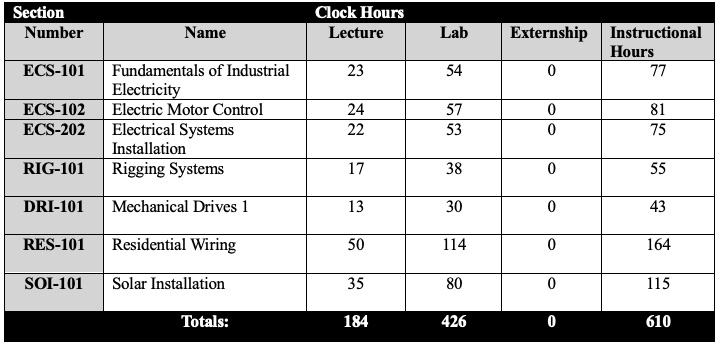7 Months – Total Clock Hours: 610
2025 – 2026 Tuition: $11,904
Start dates: 8/18/2025, 1/6/2026
Admission Requirements
Application Fee, Application, Enrollment Agreement, High School Diploma, Transcript or GED, Criminal Record Check, Child Abuse Clearance, and FBI Fingerprinting.
Program Description
This program prepares students for careers in electrical, mechanical, and renewable energy fields through a combination of theory and hands-on training. Students begin with foundational skills in industrial electricity, including electrical systems, motor controls, and safety practices. They then develop expertise in rigging and mechanical drives, learning safe equipment handling and power transmission components.
Next, students focus on residential wiring, covering essential electrical installation techniques, wiring methods, and code compliance. The program culminates with renewable energy systems, emphasizing solar technologies, system design, installation, and troubleshooting.
Students have opportunities to earn multiple SACA certifications and receive preparation for the NABCEP exam, enhancing their credentials in electrical and solar energy industries. Graduates leave the program ready to enter the workforce in diverse roles within industrial, residential, and renewable energy sectors.
Courses include:

Course Description
ECS-101: Fundamentals of Industrial Electricity
Fundamentals of Industrial Electricity introduces the fundamental principles of electricity and their applications in industrial environments, preparing students for troubleshooting, maintenance, and optimization of electrical systems. Topics include basic electrical concepts (voltage, current, resistance, power), circuit analysis using Ohm’s and Kirchhoff’s Laws, and the operation of capacitors and transformers. Students will also learn to measure electrical parameters with multimeters, develop and analyze ladder logic diagrams for control systems, and apply knowledge of limit switches, timers, electronic sensors, valves, and relays in industrial automation. This course prepares students for the SACA Electrical Systems 1 certification test. (23 lecture hours, 54 lab hours)
ECS-102: Electric Motor Control
Electric Motor Control focuses on electric motor control systems in industrial settings, emphasizing practical skills and troubleshooting techniques. Topics include designing and operating control circuits for motors, overload protection, and the use of control relays and motor starters. Students will gain hands-on experience wiring, controlling, and troubleshooting 3-phase motor control circuits. Students will also learn to configure, program, and troubleshoot Variable Frequency Drives, (VFDs) and optimize control parameters. The course also covers VFD diagnostics, fault resolution, and advanced techniques such as ramping, start boost, reduced voltage starting, and servo motion control. This course prepares students for the SACA Electric Motor Control Systems 1 and Variable Frequency Drive Systems 1 certification tests. (24 lecture hours, 57 lab hours)
ECS-202: Electrical Systems Installation
Electrical System Installation is a hands-on course that provides a foundational understanding of electrical system installation, preparing students for careers in the electrical industry. Key topics include industrial control wiring, grounding systems, panel connections, motor wiring, and raceway systems. Students will also learn basic conduit bending and sizing, as well as the wiring and configuration of Programmable Logic Controllers (PLCs) and Variable Frequency Drives (VFDs). Emphasis is placed on safety, overcurrent protection, and interpreting electrical diagrams. Through practical lab sessions and real-world scenarios, students will gain the skills to install electrical systems in industrial settings. This course prepares the student for the SACA Electrical System Installation 1 certification test. (22 lecture hours, 53 lab hours)
RIG-101 Rigging Systems
Rigging Systems teaches students the fundamentals of industrial rigging and safe equipment handling. Topics include the proper use of hoists, slings, hitches, wire rope, and chain slings. Advanced instruction continues with synthetic slings, moving heavy equipment, and operating industrial cranes. Emphasis is placed on safety procedures, inspection, and real-world application in lifting and material movement tasks common in construction and industrial settings. (17 lecture hours, 38 lab hours)
MEC-101: Mechanical Drives 1
Mechanical Drive Systems provides foundational training in mechanical power transmission. Students learn how to identify, install, and maintain components such as key fasteners, V-belt and chain drives, spur gears, and multiple shaft systems. Emphasis is placed on understanding how these systems transfer power in industrial settings, along with proper alignment, maintenance, and safety procedures. (13 lecture hours, 30 lab hours)
RES-101: Residential Wiring
Residential Wiring introduces students to the principles and practices of electrical work in residential settings. Students learn to safely install circuits, outlets, switches, lighting, and panelboards while applying the National Electrical Code (NEC). Emphasis is placed on hands-on wiring skills, wiring methods, blueprint reading, and understanding circuit design for modern home electrical systems. (50 lecture hours, 114 lab hours)
SOL101: Solar Installation
Solar Installation introduces students to solar energy concepts and technologies, including photovoltaic (PV) and solar thermal systems. Students learn site surveying, solar radiation analysis, sun path tracking, and system design. Emphasis is placed on installation practices, wiring methods, grounding, system orientation, and commissioning for both DC and AC solar PV systems in residential and commercial settings. (35 lecture hours, 80 lab hours)
